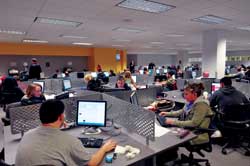Computer_Safety
| With approximately 14,000 computers on Temple’s campus — from administrative offices to computers labs to classrooms to dorm rooms — keeping online information protected is a responsibility the university takes very seriously.
Although October is National Cybersecurity Month, the university has year-round policies and procedures designed to protect and safeguard vital information, as well as identities, for student, faculty and staff computer users. Among the steps the university takes is a password policy, segmenting the computing networks by university population and using an endpoint protection program. |
 Kelly and Massa Photography
With approximately 14,000 computers, including those housed in the TECH center, Temple has implemented multiple securtiy measures to protect
online information. |
|
According to Ken Ihrer, chief information security officer in the Office of Computer and Information Services, two years ago Temple initiated a policy that requires all users of the university’s computer networks to change their password every six months. “Temple is a trend-setter out in the university world in requiring individuals change their passwords regularly,” he said. “The main reason behind this policy, which was about four years in the making, is that an individual’s password is the easiest way for someone to compromise your information.” Abbe Forman, a computer and information science instructor in Temple’s College of Science and Technology and an expert in computer ethics, said that people should use a combination of alpha, numeric and special characters such as #, @ or $ sign when creating their password. “The longer and harder you make your password, the better off you are,” she said. “Shorter passwords can be hacked in seconds by a computer program.” Ihrer said that Temple has also segmented the different user populations at the University by network. “One real key to our security strategy is separation,” said Ihrer. “We protect our administrative computing systems — where the grades, the HR data and the financial information sit — like corporate America would.” Temple has moved beyond anti-virus protection by using a Symantec endpoint protection product on every computer on campus that incorporates the traditional anti-virus with a desk-top firewall, an intrusion prevention system and host integrity checking which makes sure all the other components are functioning up-to-date, said Seth Shestack, Temple’s associate director of information security. “If those components aren’t functioning up-to-date, that particular computer is automatically quarantined,” said Shestack. “In the administrative area, the program issues an alert rather than quarantines because we have other protections in place in those areas.” While the computers on the administrative networks allow users to do more like install software and surf the Internet, the computers in university labs and classrooms are fairly well locked down, Shestack said. “Installation of software is blocked because those computers contain all the software that is in use by every college and school each semester,” he said. “Users also can’t download anything off the Internet or plug in a keylogger — which can be used to steal passwords — or install any type of spyware.” Another protective feature on the computers in the labs and classrooms is that they will automatically logout the user after 15 minutes of inactivity, said Shestack. A pop-up window also reminds users to logoff they are finished using the computer. Shestack said that computer and information services adhere to the university’s philosophy of residential life when dealing students’ computers in the dorms. “We still use the Symantec endpoint protection, but those computers are owned by the students,” he said, adding that he meets with residential living each summer to discuss what students should and should not be allowed to do computing-wise in their dorm rooms. “We segment off the dorms and we are more like an Internet provider such as Verizon or Comcast. “We have a real strong line coming from the dorm networks into our internal networks,” said Shestack. “They still come in through our firewall and we monitor them when they come into our internal networks same way we would look at someone accessing the networks from outside Temple.” Ihrer also reminds university users to be wary of bogus Temple-looking e-mails that state there is a problem with their e-mail account and requests the user’s password to correct the problem. “University computer services will never, ever ask you for your password,” he said. “We don’t need it and will never need it. So if you get an e-mail asking for your university password that should send up a huge red flag that this is not from the university.” |
|